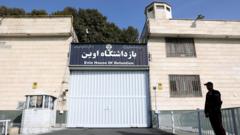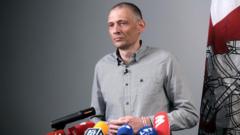Laila Soueif, the mother of jailed activist Alaa Abdel Fattah, persists with her hunger strike for his release, despite the risk of death, highlighting the plight of political prisoners in Egypt and urging the UK government for stronger action.**
British-Egyptian Activist's Mother Continues Hunger Strike Amid Concerns for Health**

British-Egyptian Activist's Mother Continues Hunger Strike Amid Concerns for Health**
Laila Soueif defies medical warnings worse than death to advocate for the release of her son, Alaa Abdel Fattah, who remains imprisoned in Egypt.**
Laila Soueif, a 69-year-old British-Egyptian mathematics professor, is sustaining her hunger strike in a London hospital, fueled by her steadfast commitment to secure the release of her son, Alaa Abdel Fattah. She is heavily aware of medical warnings indicating that her health is at critical risk after enduring eight months without food; however, she is unwavering in her resolve, stating she is prepared to die for her son's freedom. Alaa is widely recognized as Egypt's most notable political prisoner and has faced imprisonment since 2014, following a controversial sentence linked to his advocacy for democracy during the 2011 protests.
Despite doctors’ advice that her body is deteriorating rapidly, Laila insists on continuing her protest against what she describes as her son’s unjust detention. Her rejection of sustenance comes after the Egyptian government neglected to acknowledge the time Alaa spent in pre-trial detention, resulting in an extended prison term that has led his family to fear he may never be released. "He finished his sentence for God's sake," she asserts, condemning the unfair nature of his conviction in a court system she labeled as lacking integrity.
Laila's activism began anew in September 2024, coinciding with the expiration of Alaa's sentence. Her hunger strike has sparked critical conversations about the situation of political prisoners not only in Egypt but also regarding the rights of detained British nationals abroad. Last year, the UN Working Group on Arbitrary Detention labeled his detention a violation of his rights to freedom of expression and urged for his immediate release.
Her daughter, Sanaa Seif, who remains supportive of her mother’s mission, echoed the urgency of their situation, expressing outrage towards the British government for their perceived lack of action in demanding Egypt release Alaa. "Alaa needs to be out of prison and out of the country,” Sanaa stated, expressing her frustration and fear for her mother's health.
Calls from various human rights advocates and members of British Parliament have put pressure on the UK government to take more decisive diplomatic measures. Although Prime Minister Sir Keir Starmer has acknowledged the situation, urging Egyptian President Abdel Fattah al-Sisi to intervene, Sanaa believes that the government's efforts remain tepid.
Laila has undergone treatments for extreme symptoms tied to her hunger strike, including receiving electrolytes while refusing glucose injections, leading her family to worry about her precarious state. Now contemplating her mortality, Laila's poignant message, should she succumb to her hunger strike, is one of hope for her son's freedom: "Use my death as leverage to get Alaa out."
The narrative surrounding Laila Soueif and Alaa Abdel Fattah exemplifies the deeper conversations about human rights, political freedom, and the responsibilities of governments to act on behalf of their citizens.






















